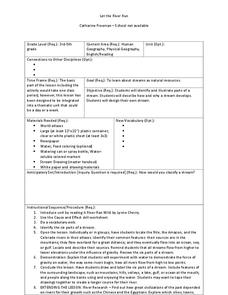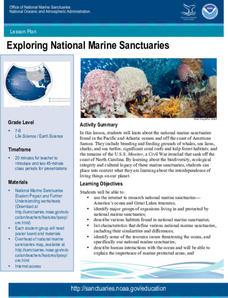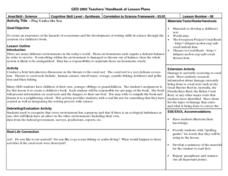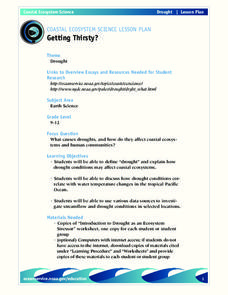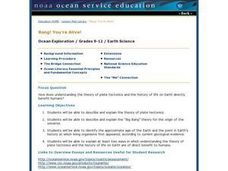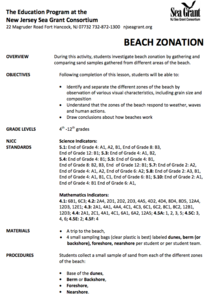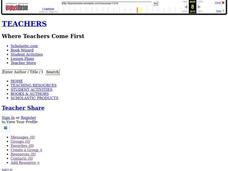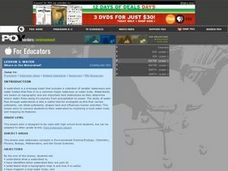Curated OER
Do Not Bleach!
Students explore the importance of protecting the coral reefs. In this Oceanography lesson, student examine how coral reefs benefit humans, identify major threats to the reefs, and discuss actions to reduce these threats.
Curated OER
Pollution Solution
Students explore the concept of environmental stewardship. For this science lesson, students investigate the effects of oil spills and brainstorm ideas to help companies avoid them as they create models to demonstrate their attributes...
Curated OER
Submersible Designer
Young scholars work in groups to design, build, and test a submersible prototype. In this engineering lesson, students learn about the importance and design of submersible vessels and apply their knowledge by building one of their own....
Curated OER
Fetch Me a Wave
Students explore waves and how they form. In this wave activity students prepare a written report on waves and tsunamis then discuss what they learned.
Curated OER
What's Down There
High schoolers write an essay about the coral reefs. In this oceanography instructional activity, students investigate the reef of Bonaire and compare it to reefs that are not thriving. High schoolers then explore the differences that...
American Museum of Natural History
What's the Big Deal About Water?
It may seem simple, but water is one of the most unique substances on Earth. An interactive online lesson describes its properties and importance in so many different situations. Learners interact with the lesson to learn the role water...
Curated OER
ROV Grid Search
Young scholars perform activities to recreate the exploration of the sea bottom. They attach magnets to the bottom of the remote controlled car to see how many camouflaged objects it can pick up. As a class, students examine the results...
Curated OER
Sound Waves
Using a karaoke machine, a guitar, and other devices, learners explore the way sound waves travel. Using this hands on approach, learners can get a better understanding of wavelength, frequency, and more.
Curated OER
Let the River Run
Students explore the environment by reading a story in class. In this water formation lesson, students define environmental terms such as rivers, streams, gulf, oceans and lakes. Students read the story A River Ran Wild and discuss the...
Curated OER
Exploring the National Marine Sanctuaries: A Lesson in Habitats and Human Impacts
Middle schoolers examine the marine sanctuaries in the Pacific and Atlantic Oceans. They discover the interdependence of all living things and work together in groups to create a poster about what they have discovered during the lesson....
Curated OER
Economy vs. Humanity
Ninth graders examine the American Slave Trade. In this World History lesson plan, 9th graders analyze photos of the Middle Passage. Students read an account of a person on one of the Middle Passage voyages.
Curated OER
Exploring National Marine Sanctuaries
Students conduct Internet research of the living organisms in national marine sanctuaries, and the resources protected in the sanctuaries. Students gather information about each of the sanctuaries and make an oral presentation and poster...
Curated OER
Play Under the Sea
Students explore the hazards of ecosystems and utilize their writing skills to create a studenT book. Threats to the ecosystem of the coral reef are discussed and used as a model for the research of the group.
Curated OER
Voyage to Kure Viewing Guide
Students complete a worksheet while viewing a video about the oceans. They locate the oceans on a map and identify positive and negative ways in which humans have impacted them. They discuss any questions at the end of the lesson.
Curated OER
Remote Sensing
Students research the Earth's ocean systems. They examine the impact of global warming on the oceans and the world as a whole.
Curated OER
Getting Thirsty?
Students explore the concept of drought and its significance as a natural hazard. In this drought lesson plan, students complete 13 questions on an "Introduction to Drought as an Ecosystem Stressor" worksheet and discuss the responses as...
Curated OER
Bang! You're Alive
Students explore the Big Bang Theory and the Theory of Plate Tectonics. In this history of life lesson, students explain two ways the Theory of Plate Tectonics and the Big Bang are of direct benefits to humans.
Curated OER
Beach Zonation
Young scholars investigate the characteristics of the beach environment and explore beach zonation. After gathering samples from different areas of the beach, students discuss how the beaches work and the characteristic of each zone....
Curated OER
Starfish
Young scholars explore the concept of starfish. For this starfish lesson, students identify the parts of a starfish and how their body works. Young scholars create a starfish using paint and a cornmeal mixture. They then glue...
Curated OER
Lost Liners Scavenger Hunt
Young scholars practice research skills by scouring Internet for facts and information about the lost ocean liners Titanic, Lusitania, and Empress of Ireland.
Curated OER
Climate Change: Is there a Controversy
Students explore climate changes. In this climate changes lesson, students research what causes changes. Students search the Internet, summarize reports they find and create a poster with the information.
Curated OER
Water: Where in the Watershed?
Students become connected to their watershed by exploring a local water body and mapping its features. They focus on how the local watershed fits into the larger scheme of the watershed.
Curated OER
Family Origins and American Cultural Pluralism
Students explore, analyze and discuss family origins, special legacies, and racial/cultural groups in literature and art that exposes them to positive examples in African-American history and culture. They encounter examples from dance,...
Curated OER
Bad Algae!
Students explore algal blooms. In this ecosystem and health instructional activity, students define and describe harmful algal blooms, then discuss ways in which the impact of these algal blooms could be reduced. Students...










